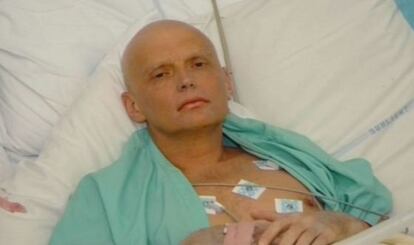Poisoned spy Litvinenko was working for Spain
Lawyer for agent’s widow claims he was investigating possible links between the Kremlin and Russian mafia

Alexander Litvinenko, the KGB spy who died in 2006 at a London hospital after he was mysteriously poisoned with the radioactive isotope polonium-210, had been an agent for Spain’s National Intelligence Center (CNI), two British dailies reported on Thursday.
According to Ben Emmerson, who is a lawyer for Litvinenko’s widow, the late KGB spy helped the CNI in an investigation into possible links between Russian President Vladimir Putin and the Russian mafia, The Daily Mail and The Evening Standard both reported on their websites.
Sources at the CNI neither denied nor confirmed whether Litvinenko had indeed worked for the agency. Nevertheless, six months before he was poisoned, Litvinenko contacted Spanish authorities to explain the connection between certain businessmen in Spain and the Russian mafia.
In 2008, José Grinda González, a special corruption and organized crime prosecutor in Spain, told a closed-door meeting of US Justice Department and Spanish investigators, that the Russian mafia had close ties to Kremlin. The revelation was discovered in one of the WikiLeaks diplomatic cables that were made public in late 2010.
Spanish prosecutor Grinda González stated that the Russian mafia had close ties to Kremlin
“Grinda stated that he considers Belarus, Chechnya and Russia to be virtual ‘mafia states’ and said that Ukraine is going to be one,” the US State Department cable said.
At a pre-inquest hearing in London, Emmerson said that Litvinenko was on the payrolls of both the CNI and MI6. His connection with the Spanish intelligence agency began after the MI6 asked him to help the CNI in their inquiries, the lawyer said. The money Litvinenko received from the CNI was deposited into a joint account he held with his wife, Marina, the inquest was told.
The 43-year-old Litvinenko was poisoned after drinking tea laced with the isotope at London’s Mayfair hotel where he held a meeting with former security colleagues. No one has been arrested in the murder case.
But Scotland Yard has maintained that the main suspects are Andrei Lugovoi, a former KGB bodyguard and Dmitri Kovtun, a former military intelligence agent. Emmerson claims that Litvinenko and Lugovoi worked closely together and had planned on traveling to Spain to provide evidence to Spanish authorities about the Russian mafia’s operations in the country and its connections to the Kremlin.
According to The Evening Standard, Hugh Davies, the counsel to the inquest, ruled out that the Chechens, the Spanish mafia and the British government in his death.
Tu suscripción se está usando en otro dispositivo
¿Quieres añadir otro usuario a tu suscripción?
Si continúas leyendo en este dispositivo, no se podrá leer en el otro.
FlechaTu suscripción se está usando en otro dispositivo y solo puedes acceder a EL PAÍS desde un dispositivo a la vez.
Si quieres compartir tu cuenta, cambia tu suscripción a la modalidad Premium, así podrás añadir otro usuario. Cada uno accederá con su propia cuenta de email, lo que os permitirá personalizar vuestra experiencia en EL PAÍS.
¿Tienes una suscripción de empresa? Accede aquí para contratar más cuentas.
En el caso de no saber quién está usando tu cuenta, te recomendamos cambiar tu contraseña aquí.
Si decides continuar compartiendo tu cuenta, este mensaje se mostrará en tu dispositivo y en el de la otra persona que está usando tu cuenta de forma indefinida, afectando a tu experiencia de lectura. Puedes consultar aquí los términos y condiciones de la suscripción digital.








































